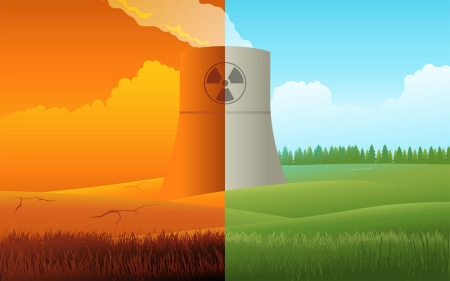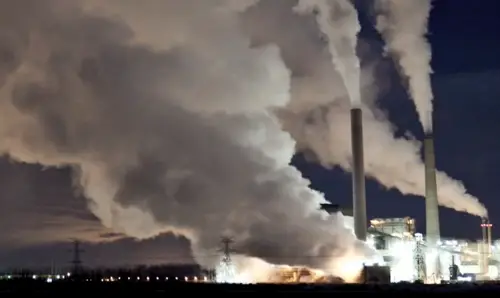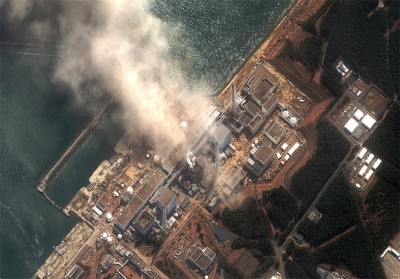
The advantages and disadvantages of nuclear energy have always generated controversy.
Nuclear tech shows up in many sectors. Most important is power generation. However, other sectors use it, such as nuclear medicine and the military industry.
Understanding the pros and cons of nuclear energy allows us to draw our conclusions.
7 Advantages of nuclear energy
The main benefits are:
1. No greenhouse gases emission
Nuclear plants produce electricity without emitting greenhouse gases.
This tech reduces the use of classic thermal power plants. They minimize the use of fossil fuels. As a result, nuclear power plants emit less polluting gases (CO2 and others).
According to the Nuclear Energy Institute, nuclear plants prevent the emission of 2 billion metric tons of CO2. This amount of gasses that power plants would have emitted using fossil fuels.
However, we must consider that most fossil fuel consumption comes from road transport (thermal engines). Many vehicles such as Cars, trucks, among others, use fossil fuels.
2. You get a lot of energy with little nuclear fuel
With a tiny amount of uranium, NPP can get large amounts of energy. It implies advantages in savings in raw material and savings in transport, extraction, and uranium handling.
The cost of uranium represents 20% of the value of the energy generated.

3. It is planned
The production of electrical energy is continuous. A nuclear power plant generates electricity for practically 90% of the hours of the year.
Nuclear energy does not depend on natural aspects like solar and wind energy do.
Solar energy depends on the hours of the sun. Eolic power depends on wind intensity. So that, not always coincide with the hours of the most significant energy demand.
Atomic energy favors electrical planning.
At the cost level, it is also plannable. Uranium does not suffer price variance than other fuels such as oil suffer.
4. Climate change friendly
As an alternative to fossil fuels, it is unnecessary to consume as many fuels as coal or oil.
The less consumption of coal and oil reduces the global warming problem. As a result, the lower the planet's climate change. Fewer fossil fuels would improve the quality of the air. The better quality of the air, the fewer diseases, and also improves the quality of life.
5. Low running cost
Nuclear power plants are cheaper to operate than their coal or natural gas rivals. The costs are between 20 and 50% of a fossil fuel plant.
The amount of energy produced is also higher than in most other forms. For instance, in the United States, it is estimated that replacing a 1GW nuclear power station would require 2GW of coal.
Additionally, research demonstrates no technical limits for reactors operating up to 80 years.
{youtube:VKWZKptmCbA}
6. Nuclear medicine
Nuclear medicine uses nuclear energy to diagnose and treat some diseases, among others.
Medicine uses some tools and techniques to help diagnose some illnesses and treatments.
7. Tech advances
Technology has made nuclear energy better in safety, cost, and production.
Today, nuclear power plants use nuclear fission. On the other hand, the international community is investigating atomic fusion. For instance, the ITER project is one of those projects.
When nuclear fusion energy is viable, most of the cons of atomic energy will disappear.
7 Disadvantages of nuclear energy
The main cons of nuclear power are as follows.

1. Nuclear accidents imply serious consequences
The safety systems in nuclear power plants are very high. However, the human component always has a specific impact. The decisions taken faced with an unforeseen event could be wrong. We have two good examples in Chernobyl and Fukushima.
Chernobyl is the worst nuclear accident in history. Several wrong decisions of the staff caused the explosion of the atomic reactor.
Fukushima's case was different. Natural causes caused the accident. However, some nuclear authorities questioned the ruling after the disaster. It was the second-worst in history.
2. Nuclear waste management
A major con is the management of nuclear waste or radioactive waste.
Nuclear waste takes many years to lose its danger. Confinement solutions exist, but radioactive waste does not disappear.
3. Installations with an expiration date
Nuclear reactors have an expiration date. After this date, NPP owners must dismantle them.
Specialists believe that it is needed to build approximately 80 new nuclear every ten years.
4. Very high initial investment
The initial investment of a nuclear plant is very high.
Investors must recover the cost during the short plant’s life. The total price is higher, considering the investment’s price plus the generated kilowatt’s worth.
In other words, the energy generated is cheap compared to fuel costs. Having to pay off the construction of the nuclear power plant makes it significantly more expensive.
5. Limited resources
Unlike other energy options, nuclear energy is not renewable.
Nuclear power requires uranium to produce energy and is not an endless resource. Uranium must be mined and searched. Thus, in the long term, uranium will be over.
6. External dependency
It generates dependence on the outside. Few countries have uranium mines. Furthermore, not all countries have nuclear technology. Consequently, they have to contract both things abroad.
7. Nuclear weapons
Nuclear technology can also create atomic weapons.
The use of nuclear energy received a massive boost during World War II. So it was developed to build the two atomic bombs that the USA dropped on Japan. Consequently, the cities of Hiroshima and Nagasaki were devastated in a few minutes. It was the first and last time that a state used atomic bombs in a military attack.
Later, several countries signed several treaties to stop them were spread. Nevertheless, nuclear weapons are created and still exist. Therefore, the risk of a future nuclear attack is real.